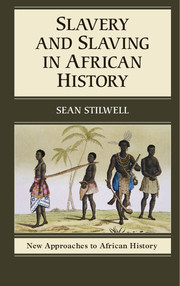4 - Slavery and African States
Published online by Cambridge University Press: 05 June 2014
Summary
Introduction
In August 1710, Andries Barendse requested his freedom. He based his request on the fact that he had been born in the Cape Town slave lodge and had worked as a mason for the Dutch East India Company (as its slave) for more than twenty years. The Council of Policy agreed and freed him. Andries was then given a job to work for the Company as a mason at a rate of pay of 10 guilders per month, only 1 guilder more than the starting pay for a teenage soldier or sailor in the service of the Company. Over the course of 170 years of Company rule in South Africa, only 108 of its slaves were given their freedom in this manner.
At the end of the nineteenth century, during a civil war in Kano (located in what is now northern Nigeria) Emirate of the Sokoto Caliphate, Dan Rimi Nuhu, a powerful royal slave official, soldier, and titleholder, crowned the rebel pretender, Yusufu, as emir. Nuhu had long supported Yusufu’s cause and claim. Nuhu was a well-known and powerful slave in the palace, but he had joined the war camp of Yusufu early on in the struggle. When Nuhu arrived on horseback, Yusufu said, “Our trip is successful, our trip is successful since Nuhu has joined us, he has joined our camp!” Thereafter, Nuhu transformed Yusufu’s military camp into the proper seat of a rival emir. He gave Yusufu the royal regalia and insisted that he follow Kano court protocol. With Nuhu’s support the rebels later took the Kano throne. Afterward, the royal slaves and their families who supported the new emir gained a substantial amount of power.
- Type
- Chapter
- Information
- Slavery and Slaving in African History , pp. 89 - 123Publisher: Cambridge University PressPrint publication year: 2014

